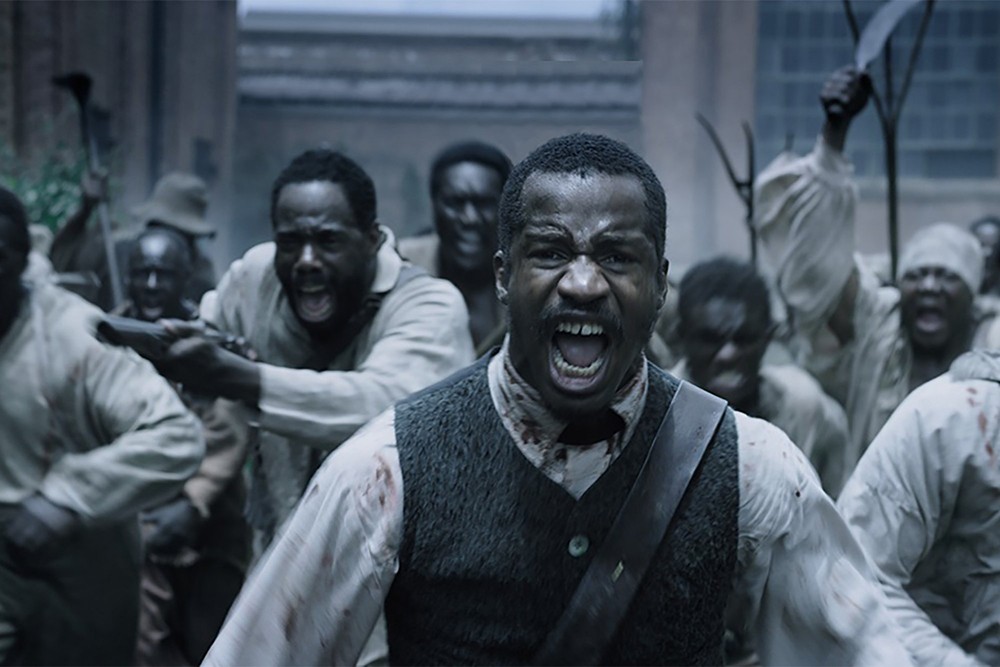The Birth of a Nation
The Birth of a Nation, 2016, 3 ¾ stars
A just re-Birth
Nate Parker’s film addresses famous slave rebellion
 From The Orlando Weekly, October 5, 2016
From The Orlando Weekly, October 5, 2016
Greatness comes in many forms. By virtue of its innovation and influence, D.W. Griffith’s Birth of a Nation, from 1915, is indeed great. It made brilliant use of techniques we now take for granted, such as close-ups and tracking shots (though it invented neither), and it was both the longest and highest-grossing American film until Gone With the Wind eclipsed it a quarter-century later.
But great doesn’t always mean good, and, in Griffith’s case, it certainly didn’t mean fair. Judged offensive by many upon its initial release, the film is now viewed as racist, a label Griffith tried to escape, with only partial success, by releasing the more sensitive, nuanced Intolerance a year later.
Fast-forward 100 years to Nate Parker and a movie with (by design) virtually the same title. The multi-faceted actor, director, writer and producer has combined all those talents to create the antithesis of Griffith’s film: the story of Nat Turner, an enslaved African-American who led perhaps the most notorious slave uprising in American history, in Virginia in 1831, which led to vicious reprisals against hundreds of slaves, most of whom played no part in the rebellion.
A devoutly religious man who publicly preached the gospel (with his owner’s permission, of course), Turner eventually felt compelled to abandon his “wait on the Lord” philosophy and take matters into his own hands, righting the terrible wrongs done to him, his family and his fellow slaves. But Parker’s script isn’t about just the rebellion. In a patient and mature fashion, the film spends most of its two hours telling Turner’s life story and helping us understand the man’s heart and mind. And that patience pays off, as the tale builds to an emotionally and visually powerful conclusion worthy of its subject. It’s not as polished as 12 Years a Slave, a film it’s being compared to, but it’s just as important.
It doesn’t get everything right, however. Parker’s directorial debut is often clunky, muddled and conventional, even heavy-handed, with writing that lacks crispness and a score that intrudes. Though Parker (Turner), Aja Naomi King (Turner’s wife), Colman Domingo (a fellow slave) and Penelope Ann Miller (a supporter of black rights) are stellar, some of the supporting actors range from merely competent (Armie Hammer, as the plantation owner) to unskilled. In addition, the movie plays loosely with the facts. For instance, the real Turner confessed to killing just one person (a woman whom he struck with a fence post). Much of his life is condensed or simply invented, and the movie misses an opportunity for much-needed moral ambiguity by ignoring the real rebellion’s slaughter of women and children. Still, can those who are passively complicit with slavery bear no blame? That question is too complex for this review, but it would have been nice to see the film tackle it.
Controversy surrounds this Birth as well: Both Parker and co-writer Jean McGianni Celestin were accused of rape in 1999. Parker was acquitted, but Celestin was convicted, though the conviction was later overturned in part because the alleged victim (who, tragically, late committed suicide) didn’t want to dredge up the past. Art should be judged for itself, not for its creators’ personal lives – how else can we appreciate a Roman Polanski film? – but the past controversy has returned to haunt Parker because the film prominently features a completely fictional rape scene.
The movie is making a political impression as well, thanks to the voter-registration drive releasing studio Fox Searchlight is sponsoring at theaters around the country. That and Parker’s statement that the film must “promote healing and systemic change in our country” have occasionally overshadowed his cinematic achievement. But what’s truly important is that Parker has mostly succeeded in capturing the spirit of Turner, and, indeed, the spirit of all enslaved people who refuse to suffer indignity and torture. Turner strove to reach the city of Jerusalem, Virginia, to steal guns from an armory. He never succeeded. But, spiritually, Turner has finally reached Jerusalem with this film.
In the annals of cinema, Griffith’s Birth of a Nation is great, but The Birth of a Nation is just.
© 2016 Orlando Weekly / MeierMovies, LLC